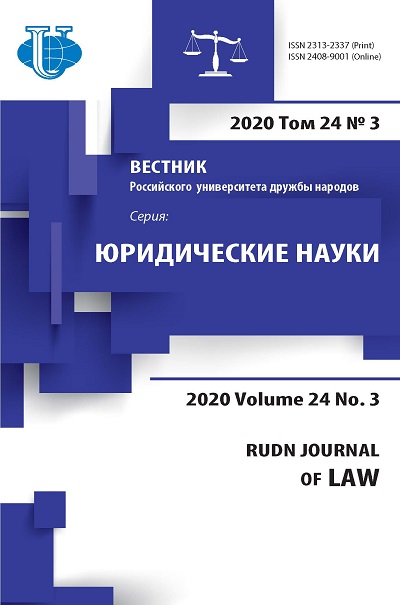CONTROL OF THE INTERNET IN THE SYSTEM OF FUNCTIONS IN THE MODERN STATE
- Authors: Strukov K.V.1
-
Affiliations:
- Legal officer of an IT company
- Issue: Vol 24, No 3 (2020)
- Pages: 629-657
- Section: LAW AND DIGITAL TECHNOLOGIES
- URL: https://journals.rudn.ru/law/article/view/24565
- DOI: https://doi.org/10.22363/2313-2337-2020-24-3-629-657
- ID: 24565
Cite item
Full Text
Abstract
The article discusses the development of state functions concerning Internet. It focuses on the analysis of the main problems that impede the development of control function. The research suggests proposals for the development of such function by the state. Based on the studies, a forecast about the prospects for further strengthening of state control over the Internet has been made.
Keywords
About the authors
Konstantin V. Strukov
Legal officer of an IT company
Author for correspondence.
Email: konstantinstrukov@gmail.com
Candidate of Legal Sciences, Legal Officer, IT Company
References
- Baytin, M.I. (1969) O formakh osushchestvleniya funktsii sotsialisticheskogo gosudarstva [On the forms of implementation of socialist state functions]. Uchenye zapiski SyUI of D.I. Kursky. Saratov. Issue 18. 267–270. (in Russian).
- Chirkin, V.E. (2007) Yuridicheskoe litso publichnogo prava [Legal entity of public law]. Moscow: NORMA Publ. (in Russian).
- Dashyan, M.S. (2007) Pravo informatsionnykh magistralei (Law of information highways): Voprosy pravovogo regulirovaniya v sfere Internet [Law of information highways: Issues of legal regulation in the field of Internet]. Moscow: Walters Kluver Publ. (in Russian).
- Eremenko, V.I. (2019) EU directive on copyright reform within the unified digital market framework. IP. Copyright and related rights. No 11. 9–22. (in Russian).
- Fetyukov, F.V. (2014) Evolution of ideas about the substance and content of the concept of «state functions». Vestnik Permskogo universiteta. Ser.: Juridicheskie nauki — Perm University Herald. Series: Yuridical Sciences. 3(25). 33–43. (in Russian).
- Gazizov, R.R. (2015) Theoretical and methodological foundations of the legal protection of personal data in the Russian Federation and abroad. Legal World. No. 7. 39–41. (in Russian).
- Haas, E.B. (1964) Beyond the Nation-State. Functionalism and International Organization. Stanford: Stanford University Press.
- Kask, L.I. (1967) O znachenii sotsial'nykh nauk [On the value of social sciences]. Jurisprudence.
- Kazarin, O.V., Tarasov, A.A. (2013) Modern concepts of cybersecurity of leading foreign countries. Bulletin of the Russian State Humanitarian University. Series: documentation and archiving. Computer science. Information protection and information security. No. 14. 58–74. (in Russian).
- Samoshchenko, I.S. (1956) O pravovykh formakh osushchestvleniya funktsii Sovetskogo gosudarstva [On legal forms of implementation of the Soviet state functions]. Soviet state and law. No. 3. 85–87. (in Russian).
- Shatilina, A.S. (2018) Human rights on the Internet: the problem of recognizing the right to access the Internet. Precedents of the European Court of Human Rights. No. 1. 38–45. (in Russian).
- Sokolov, M.S. (2013) Some of issues of information protection constituting a military secret. ENI “Military Law”. Issue No. 4. 24–40. (in Russian).
- Strukov, K.V. (2016) Control of the Russian state over the Internet: trends and development. Eurasian Law Journal. No. 10. 267–270. (in Russian).
- Tereshchenko, L.K. (2018) State Control in Personal Data Protection. The journal “Pravo. Zhurnal Vysshey shkoly ekonomiki” [“Law. Journal of the Higher School of Economics”]. No. 4. 142–161. doi: 10.17323/2072-8166.2018.4.142.161. (in Russian).
- Vyshinsky, A.Y. (1939) XVIII XVIII s"ezd VKP(b) i zadachi nauki sotsialisticheskogo prava [Congress of the VKP (b) and the tasks of the science of socialist law]. Soviet state and law. No. 3. 22. (in Russian).
Supplementary files















